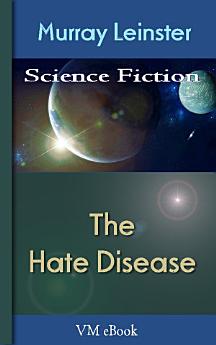The Hate Disease: Leinster'S Science Fiction
About this ebook
The Med Ship Esclipus Twenty rode in overdrive while her ship's company drank coffee. Calhoun sipped at a full cup of strong brew, while Murgatroyd the tormal drank from the tiny mug suited to his small, furry paws. The astrogation unit showed the percentage of this overdrive hop covered up to now, and the needle was almost around to the stop pin.
There'd been a warning gong an hour ago, notifying that the end of overdrive journeying approached. Hence the coffee. When breakout came, the overdrive field must collapse and the Duhanne cells down near the small ship's keel absorb the energy which maintained it. ThenEsclipus Twenty would appear in the normal universe of suns and stars with the abruptness of an explosion. She should be somewhere near the sun Tallien. She should then swim toward that sol-type sun and approach Tallien's third planet out at the less-than-light-speed rate necessary for solar-system travel. And presently she should signal down to ground and Calhoun set about the purpose of his three-week journey in overdrive.
His purpose was a routine checkup on public health on Tallien Three. Calhoun had lately completed five such planetary visits, with from one to three weeks of overdrive travel between each pair. When he left Tallien Three he'd head back to Sector Headquarters for more orders about the work of the Interstellar Medical Service.
Ratings and reviews
About the author
Murray Leinster (June 16, 1896 – June 8, 1975) was a nom de plume of William Fitzgerald Jenkins, an award-winning American writer of science fiction and alternate history. He wrote and published more than 1,500 short stories and articles, 14 movie scripts, and hundreds of radio scripts and television plays.
Leinster was born in Norfolk, Virginia, the son of George B. Jenkins and Mary L. Jenkins. His father was an accountant. Although both parents were born in Virginia, the family lived in Manhattan in 1910, according to the 1910 Federal Census.
He began his career as a freelance writer before World War I; he was two months short of his 20th birthday when his first story, "The Foreigner", appeared in the May 1916 issue of H. L. Mencken's literary magazine The Smart Set. Over the next three years, Leinster published ten more stories in the magazine. During and after World War I, he began appearing in pulp magazines like Argosy, Snappy Stories, and Breezy Stories. He continued to appear regularly in Argosy into the 1950s. When the pulp magazines began to diversify into particular genres in the 1920s, Leinster followed suit, selling jungle stories to Danger Trails, westerns to West and Cowboy Stories, detective stories to Black Mask and Mystery Stories, horror stories to Weird Tales, and even romance stories to Love Story Magazine under the pen name Louisa Carter Lee.
Leinster's first science fiction story, "The Runaway Skyscraper", appeared in the February 22, 1919 issue of Argosy, and was reprinted in the June 1926 issue of Hugo Gernsback's first science fiction magazine, Amazing Stories. In the 1930s, he published several science fiction stories and serials in Amazing and Astounding Stories (the first issue of Astounding included his story "Tanks"). He continued to appear frequently in other genre pulps such as Detective Fiction Weekly and Smashing Western, as well as Collier's Weekly beginning in 1936 and Esquire starting in 1939.
Leinster is credited with the invention of parallel universe stories. Four years before Jack Williamson's The Legion of Time came out, Leinster published his "Sidewise in Time" in the June 1934 issue of Astounding. Leinster's vision of extraordinary oscillations in time ('sidewise in time') had a long-term impact on other authors, for example Isaac Asimov's "Living Space", "The Red Queen's Race", and The End of Eternity.










